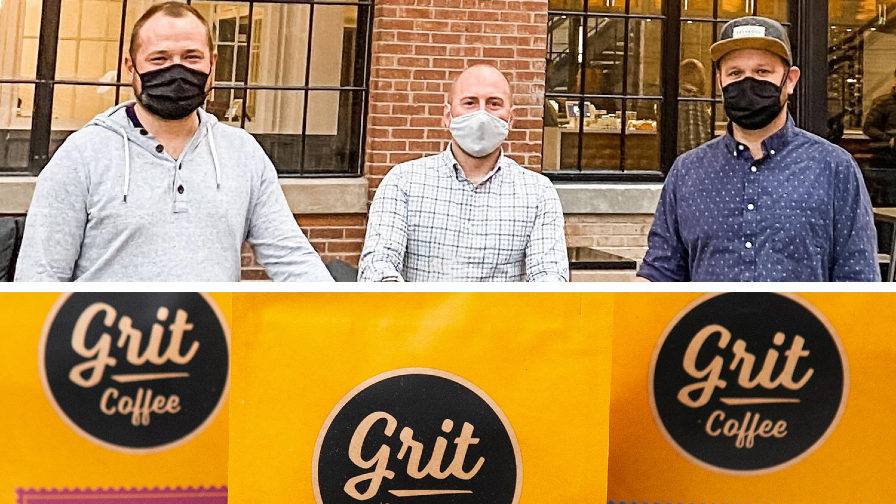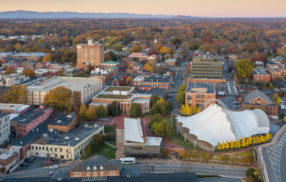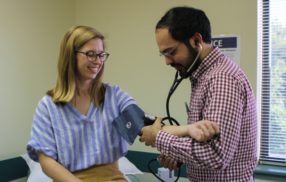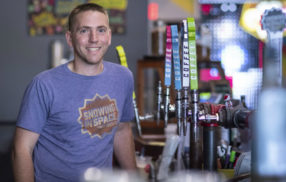
Grit Coffee Founders Form a Unique Blend After Experiences at UVA Darden
By Whitelaw Reid
The love that entrepreneurs Brandon Wooten, Brad Uhl (EMBA ’15) and Dan FitzHenry (EMBA ’18) have for the University of Virginia is pretty obvious – just check out their coffee.
The medium roast blend that they created at Charlottesville’s Grit Coffee is called “1819” — an homage to the year UVA was founded.
The coffee’s flavors include toasted almond, vanilla and a “subtle hint” of black cherry that, according to its website, is “great for sipping on The Lawn or cheering on the Hoos” — a blend that is a “celebration of the founding spirit and the pursuit of excellence.”
Wooten, Uhl and FitzHenry certainly seem to have the founding spirit thing down pat.
Ten years ago, the alumni founded a design firm in Charlottesville called “ID Company” — a business designed to help other businesses via a wide range of services, including web development, marketing and rebranding.
Today, their portfolio includes six Grit Coffee locations and The Wool Factory, a newly opened hospitality destination in Charlottesville’s newly renovated Woolen Mills, a property once owned by Thomas Jefferson that featured working mills; they later produced military uniforms for the Confederate States of America before being torched by Union forces.
On the surface, the businesses don’t seem as if they would be related, but, interestingly, they have all been designed to work in tandem with each other.
At UVA, Wooten, a 2004 grad from Waynesboro, majored in religious studies and minored in architecture; Uhl, a 2007 grad from West Chester, Pennsylvania, majored in economics and religious studies prior to earning his MBA at the Darden School of Business; and FitzHenry is an alumnus of The College of William and Mary, who worked at the Department of Defense before earning his MBA from Darden.
UVA Today caught up with the trio to learn more about how they got started, their approach to business and how their time at UVA shaped them.
What services did ID Company provide when you first started it, and what has that expanded to now?
BU: ID Company started out as a fairly straightforward creative services firm, mostly focused on developing brand identities, website design and print collateral. We still do all of those things, with a bit more focus on communication and content strategy on behalf of our clients.
In many ways, we started ID Company with the idea of continuing to do creative services for clients, but also to develop brands of our own. Grit and The Wool Factory were definitely extensions of that idea, and those are for sure the places where we’ve seen that vision come to fruition.
Can you talk about the synergy of the businesses and why they work so well together? Was this by design or did it just sort of work out that way?
BW: All of our businesses have grown out of relationships, and all complement each other in some way. I met Brad and we complemented each other’s skill sets and it was fun to see the sum of those parts help others as we provided design and brand management for clients. We started ID Company to eventually do those same things for ourselves and very early on realized that we couldn’t do that without surrounding ourselves with talented and passionate people. The ‘ID’ stands for “integrated design” — in other words, ID Company was always meant to be a design arm integrated into a larger company.
When Dan joined us, he brought the operational piece we needed to grow. Along the way, we’ve partnered up with more and more talented people, which has allowed us to grow as a company.
Can you take me through some specifics of how your businesses are mutually beneficial to each other?
DF: We are fortunate to work with incredibly talented people in all of our companies. One thing we’ve been able to do is find good people who are great at what they do, and plug them into a structure that allows them to thrive. We can plan and map out as much as we want, but a lot of what we’ve built has come together by jumping at the right opportunity at the right time when the right partner comes along.
Our businesses are symbiotic because of connections that naturally flow from one opportunity into the next, but it also takes discipline not to stray too far away from what we’ve built and commit to an opportunity that would actually distract from what we’re already doing.
The advantage of the symbiosis between our businesses is that everyone gets to where they want to be faster than if they did it on their own. For example, we didn’t roast our own coffee in the early days of Grit’s existence, but it was long a goal of ours. When the opportunity to hire a very talented coffee roaster presented itself, it meant building something completely new that we had never done before. Because we had four shops at the time, that created immediate demand for the roastery’s product, which then lowered the risk of standing up a coffee roastery from scratch, which then increased our margins on coffee sales at our shops.
We’ve since built out the wholesale and e-commerce side of our business on top of that, in addition to growing our own retail footprint.
The same thing happened when we had the opportunity to hire an incredible executive pastry chef for The Wool Factory. If you took each side in a vacuum, it probably wasn’t a perfect fit. At the time, we weren’t really planning on dedicating resources to starting a bakery operation, and she was interested in starting her own brand but would be starting from scratch. By working together, everyone was able to get where they wanted to go much faster, so we formed a joint venture called Cou Cou Rachou.
Now, The Wool Factory benefits from her enormous talent, she’s building her own brand, and she had an immediate customer base right off the bat in The Wool Factory and our Grit Coffee shops, and has quickly built upon that.
I got a chuckle out of reading something that said you guys just keep creating businesses you wish existed. But there’s a lot of truth to that, right?
BU: There definitely is. We’ve all chosen to settle in Charlottesville for the long haul (I personally never left after undergrad), and there’s an aspect of what we do that involves creating the types of businesses, both physical spaces and specific offerings, that we enjoy frequenting ourselves. It’s been really fun with the newest Grit locations and The Wool Factory, in particular, to be able to sit in those spaces and feel like they turned out the way we were all envisioning throughout.
How much have your personal interests influenced your business ideas, and, in general, what are some tips you might give people who are contemplating a business that revolves around something they really like or are passionate about? I imagine there are some risks there.
BU: I think more than anything, we’ve always tried to create things that are the best representation of what that particular business or product or space can be, while at the same time avoiding the temptation to have any of them try too hard to be something they’re not.
I think the challenge is to avoid making decisions in a vacuum. We’ve been fortunate enough to have extremely talented individuals jump on board along the way. I’m more of a generalist at heart, but when you have people on the team like Brandon, with his strategic insights and creative direction, or Tucker Yoder and Rachel De Jong creating amazing things in the kitchen at The Wool Factory, or Travis Mason, Grit’s director of coffee, sourcing dozens of incredible coffees, it’s hard not to want to push those ideas forward.
There’s definitely risk involved in all of that, and trust me, we’re good at sitting together and convincing ourselves that we’re geniuses, but we have an amazing team that has worked tirelessly to put things forward that we’re proud of and hopefully resonate with our clients and customers.
With Grit, we are always aiming to be approachable, but also to make sure we do our best to showcase the coffees themselves. The sheer amount of effort that went into these coffees before they ever make it to our roastery or into your cup is incredible, and Travis and the entire Grit barista team do an amazing job bringing out the best of each coffee in an effort to let the finished product speak for itself.
At The Wool Factory, we had an opportunity to highlight such a unique historic space in our town. We really wanted to let the original structure do as much of the talking as possible. Add to that a group of amazing professionals with decades of hospitality and food and beverage experience — seriously, it’s a dream team — and we couldn’t be prouder of how things turned out. It’s obviously not been the launch we had hoped for, but we’re all eagerly awaiting the opportunity to share the full property with guests in the months and years ahead.
How have your businesses been affected during the pandemic, and how do you see the future of brick-and-mortar businesses? Have you had to pivot?
BW: For Grit, we went from almost all of our sales being in our shops to pivoting to an entirely e-commerce-driven company during the stay-at-home orders. As we’ve slowly opened our shops back up (currently carryout-only still), we’ve been able to continue to grow e-commerce, which has been great. We had been working on a new shop in Richmond prior to the pandemic; we had to push that opening back, but did eventually open that a few months back.
For The Wool Factory, we were supposed to open in April with a wedding, and that obviously got pushed back. We eventually opened Selvedge Brewing and The Workshop under strict COVID protocols in June and those two aspects of the business have gone well thus far. As primarily an event space, we’ve had to shift our focus out of necessity. We have hosted a few micro-weddings and other small events, but we’ve basically had to pivot and grit it out until it’s safe to fully open the property and start hosting events.
The University of Virginia Darden School of Business prepares responsible global leaders through unparalleled transformational learning experiences. Darden’s graduate degree programs (MBA, MSBA and Ph.D.) and Executive Education & Lifelong Learning programs offered by the Darden School Foundation set the stage for a lifetime of career advancement and impact. Darden’s top-ranked faculty, renowned for teaching excellence, inspires and shapes modern business leadership worldwide through research, thought leadership and business publishing. Darden has Grounds in Charlottesville, Virginia, and the Washington, D.C., area and a global community that includes 18,000 alumni in 90 countries. Darden was established in 1955 at the University of Virginia, a top public university founded by Thomas Jefferson in 1819 in Charlottesville, Virginia.
Press Contact
Molly Mitchell
Senior Associate Director, Editorial and Media Relations
Darden School of Business
University of Virginia
MitchellM@darden.virginia.edu








